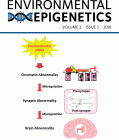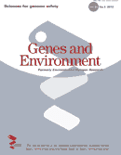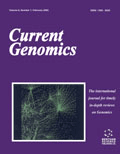
Environmental Epigenetics
Scope & Guideline
Innovating Understanding of Health through Environmental Perspectives
Introduction
Aims and Scopes
- Environmental Exposure and Epigenetics:
The journal investigates how various environmental exposures, such as air pollution, pesticides, and heavy metals, lead to epigenetic changes that affect human health and development. - Transgenerational Epigenetic Inheritance:
Research on how epigenetic modifications can be passed down through generations, leading to inherited traits and health outcomes influenced by previous environmental exposures. - Integration of Omics Technologies:
Utilization of advanced omics technologies (genomics, transcriptomics, epigenomics) to understand the molecular mechanisms underlying environmental epigenetics. - Health Implications of Epigenetic Changes:
Examination of the health consequences of epigenetic alterations caused by environmental factors, including chronic diseases, neurodevelopmental disorders, and reproductive health. - Societal and Policy Impact:
Discussion on the broader implications of epigenetic research for public health policies and societal challenges, particularly in the context of climate change and environmental justice.
Trending and Emerging
- Climate Change and Epigenetics:
There is a noticeable increase in research exploring the epigenetic adaptations to climate change, highlighting the urgency of understanding how environmental changes affect biological processes. - Artificial Intelligence in Epigenetic Research:
The integration of artificial intelligence and machine learning techniques to analyze complex epigenetic data sets is becoming a prominent theme, indicating a shift towards innovative methodologies. - Socioeconomic Factors and Epigenetics:
Emerging studies are focusing on the relationship between socioeconomic status and epigenetic changes, underscoring the importance of social determinants of health in epigenetic research. - Art and Epigenetics:
Interdisciplinary approaches that explore the connections between epigenetics and the arts are gaining interest, suggesting a broader cultural engagement with scientific concepts. - Pesticide Exposure and Epigenetic Effects:
Research on the epigenetic consequences of pesticide exposure in human populations is increasingly frequent, reflecting growing public health concerns related to agricultural practices.
Declining or Waning
- Basic Mechanistic Studies:
There appears to be a reduction in studies focusing purely on the basic biological mechanisms of epigenetic changes without direct environmental context, as the journal increasingly emphasizes applied and translational research. - Non-Human Models:
Research using non-human models (e.g., lab animals) seems to be waning in favor of studies that emphasize human populations and epidemiological approaches, reflecting a desire for findings that are directly relevant to human health. - Single-Factor Analysis:
The trend is moving away from studies that analyze the effects of single environmental factors in isolation, with more emphasis now on multi-factorial analyses that consider complex interactions.
Similar Journals

CHROMOSOMA
Shaping the Future of Genetics, One Study at a TimeCHROMOSOMA is a prestigious journal dedicated to advancing the field of genetics, published by Springer in Germany. With an ISSN of 0009-5915 and an E-ISSN of 1432-0886, this journal has been a cornerstone in the publishing landscape since its inception in 1939, serving as a critical resource for researchers and professionals interested in the intricacies of chromosomal biology. Although it operates on a subscription basis, the journal's rigorous peer-review process ensures the dissemination of high-quality research findings. With a commendable Q2 ranking in both genetic and clinical genetics categories as of 2023, CHROMOSOMA aims to bridge theoretical concepts with practical applications in medicine and biology. Researchers will appreciate its relevance, as indicated by its Scopus ranks and integration of diverse topics ranging from molecular genetics to clinical implications. By fostering collaboration and knowledge-sharing among scholars, CHROMOSOMA continues to shape the future of genetic research.

Clinical Epigenetics
Empowering Researchers with Open Access to Epigenetic InsightsClinical Epigenetics is a pioneering open-access journal published by BMC, dedicated to advancing the field of epigenetics and its critical implications in clinical and translational research. Established in 2011, the journal has become an authoritative resource in the realms of developmental biology, genetics, and molecular biology, as evidenced by its impressive 2023 Scopus categorization as a Q1 journal in multiple domains including clinical genetics. With a robust impact factor and rankings that place it among the top quartiles in its fields—Rank #13 in Clinical Genetics and #14 in Developmental Biology—Clinical Epigenetics serves as an essential platform for researchers, professionals, and students alike, encouraging the dissemination of high-quality research findings. Operating from its United Kingdom headquarters, this journal not only contributes to scholarly dialogue across the globe but also supports unrestricted access to vital findings that push the boundaries of our understanding of epigenetic mechanisms and their clinical applications.

JOURNAL OF MOLECULAR MEDICINE-JMM
Championing High-Quality Research in Biomedical Science.JOURNAL OF MOLECULAR MEDICINE (JMM) is a premier publication dedicated to advancing the field of molecular medicine, encompassing critical areas such as drug discovery, genetics, and biochemistry. Published by Springer Heidelberg in Germany, this influential journal has established its significance within the academic community, achieving an impressive Q1 ranking across multiple categories as of 2023, including Drug Discovery, Clinical Genetics, and Molecular Medicine. With a focus on publishing high-quality research and novel insights, JMM appeals to a diverse audience of researchers, professionals, and students passionate about the molecular underpinnings of health and disease. The journal, which has seen a convergence of relevant research spanning from 1976 to 2024, is instrumental in showcasing groundbreaking studies that push the boundaries of knowledge in molecular therapeutics and biomedical science. While it does not offer open access, the rigor of its peer-reviewed content ensures that each publication is a valuable addition to the scientific discourse surrounding molecular medicine. For comprehensive studies and reviews that highlight the intersection of molecular biology and clinical application, look no further than JOURNAL OF MOLECULAR MEDICINE.

Cell Discovery
Advancing the Frontiers of Cellular ScienceCell Discovery, published by SPRINGERNATURE, is a premier open access journal in the dynamic fields of Biochemistry, Cell Biology, Genetics, and Molecular Biology. Since its inception in 2015, this journal has established itself as a key platform for disseminating high-impact research and is recognized with a Q1 ranking across all its core categories for the year 2023. With its remarkable Scopus rankings—7th in Genetics, 9th in Biochemistry, 13th in Molecular Biology, and 15th in Cell Biology—Cell Discovery positions itself among the elite journals in life sciences, showcasing the most innovative breakthroughs and comprehensive reviews. Based in the United Kingdom, this journal operates under an open access model, ensuring that groundbreaking discoveries are readily available to researchers, professionals, and students around the globe. With a commitment to advancing scientific knowledge, Cell Discovery welcomes contributions that push the frontiers of our understanding in cellular and genetic sciences.

Reproductive Biology and Endocrinology
Pioneering Insights in Reproductive and Endocrine HealthReproductive Biology and Endocrinology, published by BMC, is a distinguished open-access journal established in 2003, catering to researchers and professionals in the interdisciplinary fields of reproductive biology, endocrinology, and related biomedical sciences. With a notable impact in 2023, the journal has achieved Q1 rankings in Obstetrics and Gynecology, Reproductive Medicine, and Endocrinology, alongside a Q2 ranking in Developmental Biology, establishing itself as a pivotal source of high-quality research and insights. The journal's commitment to freely accessible research promotes knowledge dissemination across its domains, which is crucial for advancing understanding of reproductive health and endocrine mechanisms. With a robust Scopus ranking showcasing its relevance—17th out of 209 in Obstetrics and Gynecology, and 8th out of 90 in Reproductive Medicine—it serves as an essential resource for academics and clinicians alike, facilitating innovative research and fostering collaboration within the global scientific community.

Andrology
Elevating research standards in andrology and endocrinology.Andrology, an esteemed journal published by WILEY, is dedicated to advancing the field of reproductive health and medicine. With an ISSN of 2047-2919, this journal spans critical topics in andrology, urology, and endocrinology, reflecting its strong commitment to scholarly excellence and innovation. As a Q1 ranked journal in both Reproductive Medicine and Urology, Andrology boasts impressive Scopus rankings, standing at 6th in Reproductive Medicine and 8th in Urology, placing it in the top 10% of its field. The journal is accessible as an Open Access platform, ensuring that valuable research findings are available to a broader audience. With significant impact evidenced by its categorization in Q2 for Endocrinology and Diabetes and Metabolism, Andrology serves as an essential resource for researchers, clinicians, and students alike, supporting the continued advancement of knowledge and practice in male reproductive health.

Genes and Environment
Unraveling the Threads of Genetics and EnvironmentGenes and Environment is a premier interdisciplinary journal published by BMC that explores the dynamic interplay between genetic factors and environmental influences shaping health and behavior. Since its inception, the journal has gained recognition for its commitment to providing open access (since 2015) to groundbreaking research, fostering an inclusive platform for scholars worldwide. With an ISSN of 1880-7046 and an E-ISSN of 1880-7062, Genes and Environment consistently ranks in Q2 in Environmental Science, Q3 in Genetics, and Q2 in Social Psychology according to the 2023 category quartiles, highlighting its significant contributions to these fields. The journal is headquartered in the United Kingdom and has a diverse portfolio of research spanning from 2006 to 2024. It is recognized in Scopus with commendable rankings across various disciplines. By fostering dialogue among researchers, professionals, and students, Genes and Environment serves as a vital resource for understanding complex biological interactions with environmental factors, ultimately aiming to advance knowledge and inform public policy.

GENE
Pioneering Insights in Genetics Since 1976GENE, an esteemed journal published by Elsevier, serves as a vital resource for researchers and professionals in the fields of genetics and medicine. With an ISSN of 0378-1119 and an E-ISSN of 1879-0038, this scholarly journal has been at the forefront of genetic research since its inception in 1976 and is set to continue until 2025. Situated in the Netherlands, GENE is recognized for its significant contributions, reflected in its Q2 ranking in both Genetics and Miscellaneous Medicine categories for 2023. This positioning within the Scopus rankings demonstrates its impact and relevance in a competitive field, where it holds the rank of #129 out of 347 in Genetics, placing it within the 62nd percentile. Although it does not offer open access options, GENE provides invaluable insight into contemporary genetic research, thereby fostering academic discussions and advancements. Researchers, professionals, and students alike will find GENE an essential platform for disseminating knowledge and exploring innovative developments in genetics and associated sciences.

CURRENT GENOMICS
Fostering innovation in the realm of genomics.CURRENT GENOMICS is a premier journal published by Bentham Science Publishers that focuses on the expansive field of genomics, including both clinical and molecular genetics. With the ISSN 1389-2029 and E-ISSN 1875-5488, this esteemed journal has been disseminating significant scientific insights since its inception in 2000 and continues to contribute to the field through 2024. Based in the United Arab Emirates, CURRENT GENOMICS boasts a Q3 ranking in both the genetics and clinical genetics categories for 2023, reflecting its growing impact in the scientific community. Although not an open-access journal, it provides valuable content that supports researchers and professionals in navigating the complexities of genetic research and its applications. By publishing original research articles, reviews, and case studies, CURRENT GENOMICS aims to foster a deeper understanding of genomic science and its implications for medicine, thus playing a critical role in the advancement of genetics and biomedical research.

Epigenomics
Charting New Territories in Cancer and Genetic Research.Epigenomics is a leading journal in the realms of Cancer Research and Genetics, published by Future Medicine Ltd in the United Kingdom. With an ISSN of 1750-1911 and an E-ISSN of 1750-192X, the journal has been an integral part of the scientific community since its inception in 2009, and is set to converge its impactful research publications through 2024. The journal occupies a significant position in its category quartiles as evidenced by its ranking—Q3 in Cancer Research and Q2 in Genetics as of 2023. With Scopus rankings of #138/347 in Genetics and #113/230 in Cancer Research, it demonstrates scholarly excellence and is recognized for its contributions to understanding the role of epigenetic modifications in health and disease. While Epigenomics operates under traditional subscription models, it remains a vital resource for researchers, professionals, and students eager to explore the complex interplay between genes and the epigenome. The journal's innovative approach to epigenetics and its impact on cancer research makes it essential reading for those at the forefront of biomedical research.